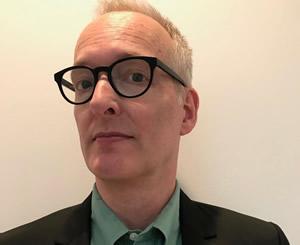RTVF Associate Professor Jeffrey Sconce Awarded Guggenheim Fellowship
 Jeffrey Sconce, associate professor in the Department of Radio/Television/Film, is a recipient of the prestigious 2020 Guggenheim Fellowship, one of the highest honors awarded to scholars in the arts, humanities, and sciences.
Jeffrey Sconce, associate professor in the Department of Radio/Television/Film, is a recipient of the prestigious 2020 Guggenheim Fellowship, one of the highest honors awarded to scholars in the arts, humanities, and sciences.
“I am thrilled,” Sconce says. “It’s an honor to be included among the many scholars and artists recognized by the Guggenheim Foundation.”
Sconce, a cultural historian of media and film, is the author of Haunted Media: Electronic Presence from Telegraphy to Television (Duke University Press, 2000) and The Technical Delusion: Electronics, Power, Insanity (Duke University Press, 2019), as well as numerous articles and essays. He is the editor of Sleaze Artists: Cinema at the Margins of Taste, Style, and Politics (Durham: Duke University Press, 2007). A Northwestern faculty member since 2002, Sconce earned his bachelor of arts, bachelor of science, and master of arts at the University of Texas at Austin, and his doctoral degree at the University of Wisconsin-Madison.
Sconce said his Guggenheim project will be an extension of his first two books, which examined the historical association of electronic media with “magical thinking.” The new project focuses especially on the idea of “paracosms,” imaginary fantasy worlds of adolescence and adulthood that have become increasingly interdependent with media technologies and content.
Funding from the Guggenheim fellowship will support research trips to the archives of the BBC, British child psychoanalyst D.W. Winnicott, and the late Los Angeles artist Mike Kelley. The project will examine how various media, from the beginnings of popular print culture in the early 19th Century to today’s digital environments, became both objects and facilitators of imaginary worlds.
“I am especially interested in fantasies of how the media function within fantasy worlds, whether they be creations of conspiracy theory, Victorian juvenalia, or contemporary MMORPG gaming,” Sconce says.
Sconce heard the news that he was awarded the fellowship through social media, and he congratulated two other Midwest recipients of the fellowship this year in the film and video field of study: Pam Wojcik at the University of Notre Dame and Patrick Jagoda at the University of Chicago.
“It was the Midwest trifecta,” Sconce said.
The timing, though, has been curious.
“A little weird getting this during the Apocalypse, but I’ll take it,” Sconce says of the COVID-19 crisis.
Edward Hirsch, president of the Guggenheim Memorial Foundation, said in a statement that it is “exceptionally encouraging to be able to share such positive news at this terribly challenging time.”
“A Guggenheim Fellowship has always offered practical assistance, helping fellows do their work, but for many of the new Fellows, it may be a lifeline at a time of hardship, a survival tool as well as a creative one,” Hirsch said. “As we grapple with the difficulties of the moment, it is also important to look to the future. The artists, writers, scholars, and scientific researchers supported by the fellowship will help us understand and learn from what we are enduring individually and collectively, and it is an honor for the foundation to help them do their essential work.”
Sconce is now among the eight Guggenheim Fellowship-winner in the RTVF department, including Professors Thomas Bradshaw, Laura Kipnis, Lynn Spigel and Marco Williams, Associate Professors Eric Patrick and J.P. Sniadecki, and incoming Assistant Professor Erin Courtney, said department chair Zayd Dohrn.
“It’s incredibly exciting to have Jeff honored as a 2020 Guggenheim Fellow—a recognition of Jeff’s extraordinary scholarship as well as the promise of his next project,” Dohrn says.
Northwestern University Weinberg College of Arts and Sciences faculty members Héctor Carrillo and Dyan Elliott are also recipients of the prestigious fellowship this year.
The John Simon Guggenheim Memorial Foundation awarded the coveted fellowship to a select group of 175 individuals from a pool of nearly 3,000 applicants from the United States and Canada this year. The fellows, who have demonstrated “exceptional capacity for productive scholarship or exceptional creative ability in the arts,” receive grants for up to one year of work on a special project. The foundation has awarded more than $375 million since 1925 to more than 18,000 fellows, a field that has included Nobel laureates, Fields medalists, poets laureate and winners of the Pulitzer Prize.
